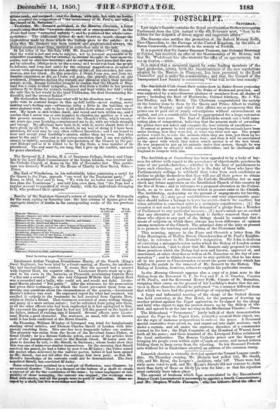The.Archbishop of Canterbury has been appealed to by a body
of lay men for advice with regard to the prevalence of objectionable practices in some of our parish-churches,—whether it is the duty of parishioners to leave such churches; and whether it is the duty of those who have the Parliamentary suffrage to withhold their votes from such candidates as decline to pledge themselves that they will use all their power to obtain a reimposition of such portions of the Catholic Disabilities Act- as may check any future aggression on the Established Church of this country by the See of Rome ; and in reference to a proposed alteration in the Prayer- book, so as to meet the divisions which at present exist in the Church. The-Archbishop, apologising on the ground of engagements for brevity, replies, that (1.) only great unfaithfulnces said 'very objectionable prac- tices ahonldinduce a layman to leave his pnrith-chareh fbr• another, but when salvation is concerned order is a secondary' consideration ; (2.) the occasion is not such as to justify the demand of a pledge from a Member of Parliament to any particular measure ; (3.) men's minds are so excited that any alteration of • the Prayer-book is further removed than ever : those who object to any part of the liturgy should bo reminded that it treats of. subjects on which there always has been difference of opinion among members of the Church. The principal duty of the laity at present is to promote the teaching and preaching of the Protestant faith. This morning, appears in the Peres and Chronicle a letter from Sir John Harrington, of Harrill Street, Churchwarden of St. Paul's Knights- bridge, in reference to Mr. Bennett's resignation. Sir John is desirous of correcting a misapprehension under which the Bishop of London seems to have- laboured, "and to show that Mr. Bennett only proposed to retain those practices which the Bishop had seen and known, approved of, and sanctioned, at other churches as well as at St. Barnabas on the day of con- seeration " ; and he thinks it necessary to state publicly, that he has done all in his power as Churchwarden to-avert the great calamity which has befallen the parish in the removal of Mr. Bennett by the Bishop. The Bishop of London, however, refuses to explain his particular reasons.
In. the Morning Chronicle appears also ,a copy of- a joint note to the Bishop from the Reverend G. F. De Gex and F. A. G. Ouseley, Curates of St. Paul's, and the Reverend Henry Fyffe, Curate of St. Barnabas, resigning their cures, on the ground of his-Lordship's desire that the ser- vices in these churches should be performed "in a- manner different from that which we have had the great privilege of enjoying hitherto." A large and influential meeting of the clergy of the Oxford diocese Was held yesterday, at the Star Hotel, for the purpose of drawing up another protest against the Papal aggression, to be signed by the clergy and laity who object to sign the protest drawn up by the Bishop of ox- ford, and agreed to at the late meeting in the filheidonian Theatre.—Turies. The Birkenhead " Protestants " lately balltald of their demonstration against the Pope by the Papist frith, yesterday accrued their object, un- der the tegis of immense preparations to enfotee the peace. A thousand special constables were sworn in, and organf Led into eight sections, each under a captain, and all under tho suprerue direction of a commander learned in the law ; the High Constable of the Hundred of Wurral drew forth all his posse; and three hundred of the Liverpool Police reonforeed the local authorities. The Roman Catholicriest saw the danger of bringing his people even within sight of ;such an array, and issued notices bidding them to keep away from the sleeting. So ten: thousand Protest- ants without let or hinderance adopter' an address of the common stamp.


























 Previous page
Previous page